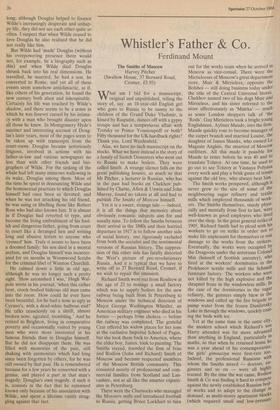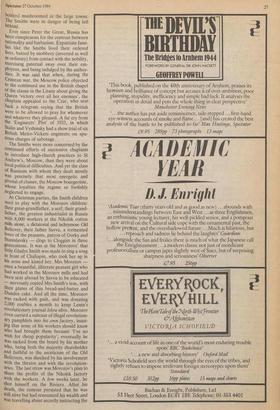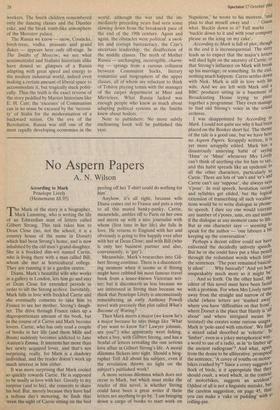Whistler's Father & Co.
Ferdinand Mount
The Smiths of Moscow Harvey Pitcher (Swallow House, 37 Bernard Road, Cromer, £5.95)
What am I bid for a manuscript, original and unpublished, telling the story of, say, an 18-year-old English girl who goes to Russia to be nanny to the children of the Grand Duke Vladimir, is kissed by Rasputin, dances off with a gypsy troupe and has a tempestuous affair with Trotsky or Prince Youssoupoff or both? Fifty thousand for the UK hardback rights? Thank you, Lord Weidenfeld.
Alas, we have no such manuscript on the stocks. What we have instead is the story of a family of Scotch Dissenters who went out to Russia to make boilers. They were called Smith. A strange silence falls on the great publishing houses, so much so that Mr Pitcher, a lecturer in Russian, who has in the past had books on Chekhov pub- lished by Chatto, Allen & Unwin and John Murray, found no takers at all and had to publish The Smiths of Moscow himself.
Yet it is a sweet, strange tale — indeed, it is all the things that memoirs about obviously romantic subjects aim for and usually miss. To follow the Smiths between their arrival in the 1840s and their hurried departure in 1917 is to follow another side of social history, one rigorously excluded from both the socialist and the sentimental versions of Russian history. The suppres- sion of this other side has fatally distorted the West's picture of pre-revolutionary Russia. And it is typical that we have to write off to 37 Bernard Road, Cromer, if we wish to repair the omission.
Richard Smith went out from Renfrew at the age of 23 to manage a small factory which was to supply boilers for the new railway being built from St Petersburg to Moscow under the technical direction of Major George Washington Whistler, an American military engineer who died in his forties — perhaps from cholera — before the railway was completed. The grateful Czar offered his widow places for her sons at the exclusive Imperial School of Pages, but she took them back to America, where the elder boy, James, took to painting. The Smiths stayed, founded the firm of Ivan and Rodion (John and Richard) Smith of Moscow and became respected members of the Moscow British community. This consisted mostly of professional and com- mercial families from Scotland and Lan- cashire, not at all like the smarter expatri- ates in Petersburg.
There were the Charnocks who managed the Morozov mills and introduced football to Russia, getting Bruce Lockhart to turn out for the works team when he arrived in Moscow as vice-consul. There were the Mirrieleeses of Moscow's great department store, Muir & Mirrielees, opposite the Bolshoi — still doing business today under the title of the Central Universal Stores. Chekhov named two of his dogs Muir and Mirrielees, and his sister referred to the store affectionately as `Muirka' — much as some London shoppers talk of 'the 'Rods'. Guy Mirrielees took a bright young Englishman, Aylmer Maude, into the firm. Maude quickly rose to become manager of the carpet branch and married Louise, the daughter of James Shanks, who owned Le Magasin Anglais, the smartest of Moscow outfitters. All this made it possible for Maude to retire before he was 40 and to translate Tolstoy. At one time, he used to go out to see Tolstoy at Yasnaya Polyana every week and play a brisk game of tennis against the old boy, who always beat him.
The Smith works prospered, although it never grew to the size of some of the neighbouring sugar refinery and textile mills which employed thousands of work- ers. The Smiths themselves, sturdy physi- cally and mentally from first to last, were well-known as good employers who lived over the shop. In the great general strike of 1905, Richard Smith had to plead with his workers to go on strike in order not to make life unpleasant for themselves or risk damage to the works from the strikers. Eventually, the works were occupied by the Dragoons under the notorious Colonel Min (himself of Scottish ancestry), wh° fired at the workers' dormitories in the Prokhorov textile mills and the Schmidt furniture factory. The workers who were not killed by the high explosive and the shrapnel froze in the windowless mills. In the case of the dormitories in the sugar refinery, the gunners simply blew in the windows and called up the fire brigade to pump water from the frozen DanilovskY Lake in through the windows, quickly coat- ing the beds with ice. Yet at the same time in the same city, the modern school which Richard's son Harry attended was far more advanced than anything in England, particularly in maths, so that when he returned home. he was a year ahead of his contemporaries; the girls' gimnaziya were first-rate too. Indeed, the professional Russians with whom the Smiths mixed -- doctors, en- gineers and so on — were all highly trained. By the time the war came, Rodion Smith & Co was finding it hard to compete against the newly established Russian boil- er works and to adapt to the change in demand, as multi-storey apartment blocks (which required small and low-pressure boilers) mushroomed in the large towns. The Smiths were in danger of being left behind.
Ever since Peter the Great, Russia has been conspicuous for the contrast between rationality and barbarism. Expatriate fami- lies like the Smiths lived their ordered lives, barred by snobbery (inverted as well as ordinary) from contact with the nobility, exercising paternal sway over their em- ployees, and being indulged by the author- ities. It was said that when, during the Crimean war, the Moscow police objected to the continued use in the British chapel of the clause in the Litany about giving the Queen 'victory over all her enemies', the chaplain appealed to the Czar, who sent back a telegram saying that the British were to be allowed to pray for whomever and whatever they pleased. A far cry from the 'Engineers' Plot' of 1933, in which Stalin and Vyshinsky had a show trial of six British Metro-Vickers engineers on spu- rious charges of sabotage.
The Smiths were more concerned by the Continued efforts of successive chaplains to introduce high-church practices to St Andrew's, Moscow, than they were about local political difficulties. And yet the class of Russians with whom they dealt mostly was precisely that most energetic and Pivotal of classes, the Moscow bourgeoisie, whose loyalties the regime so foolishly neglected to engage.
At Christmas parties, the Smith children used to play with the Morozov children: their great-grandfather, a serf; their grand- father, the greatest industrialist in Russia With 8,000 workers at the Nikolsk cotton mills alone, a dictatorial and lachrymose Old Believer; their father Savva, a tormented lover of the peasants, patron of Gorky and Stanislaysky — clogs to Cloggies in three generations. It was at the Morozovs' that little Gladys Smith was made to sing a song in front of Chaliapin, who took her up in his arms and kissed her. Mrs Morozov once a beautiful, illiterate peasant girl who had worked in the Morozov mills and had been sent abroad by Savva to be educated -- nervously copied Mrs Smith's teas, with their plates of thin bread-and-butter and Dundee cake. And all the time, Morozov was racked with guilt, and was donating 2,000 roubles a month to keep Lenin's revolutionary journal Iskra alive. Morozov even carried a suitcase of illegal revolution- pamphlets into his own factory, insist- ing that none of his workers should know Who had brought them because 'I've no wish for cheap popularity'; eventually he Was sacked from the board by his mother Who, being both the majority shareholder and faithful to the asceticism of the Old Believers, was shocked by his involvement With the theatre and with the revolution- aries. The last straw was Morozov's plan to share the profits of the Nikolsk factory with the workers. A few weeks later, he shot himself on the Riviera. After his death, the rumour persisted that he was Still alive but had renounced his wealth and Was travelling about secretly instructing the
workers. The Smith children remembered only the dancing classes and the Dundee cake, and the bleak tomb-like atmosphere of the Morozov palace.
The Russia we know — snow, Cossacks, birch-trees, vodka, peasants and grand dukes — appears here only off-stage. In The Smiths of Moscow, we see what sentimentalist and Stalinist historians alike have denied us: glimpses of a Russia adapting with great speed and energy to the modern industrial world, indeed even making a certain amount of liberal space to accommodate it, but tragically stuck politi- cally. Thus the truth is the exact reverse of the story peddled by Marxist historians like E. H. Carr; the 'excesses' of Communism can in no sense be excused by the 'necessi- ty' of Stalin for the modernisation of a backward nation. On the eve of the Revolution, Russia was still one of the most rapidly developing economies in the
world, although the war and the im- mediately preceding years had seen some slowing down from the breakneck pace of the end of the 19th century. Again and again, the obstacles were political: a swol- len and corrupt bureaucracy, the Czar's uncertain leadership, the disaffection of the middle classes. The myth of Mother Russia — unchanging, incorrigible, charm- ing — springs from a curious collusion between Communist hacks, literary romantics and biographers of the upper classes, all of whom are reluctant to think of Tolstoy playing tennis with the manager of the carpet department at Muir and Mirrielees. What Russia lacked was _enough people who knew as much about adapting political systems as the Smiths knew about boilers.
Note to publishers: No more subtly enchanting book will be published this year.




















































 Previous page
Previous page